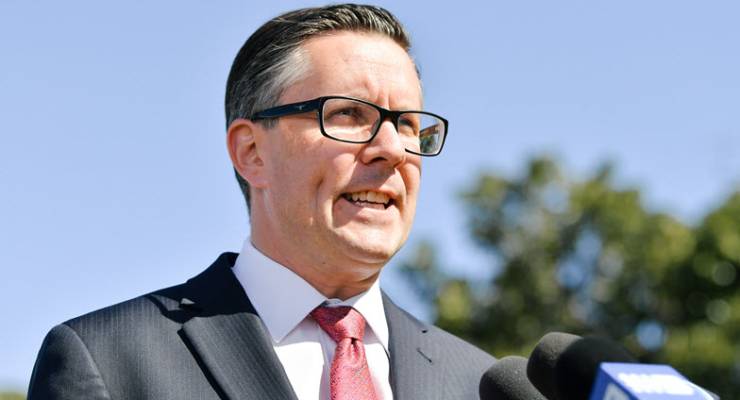
Mark Butler
Georgina Downer, preselected as the Liberal candidate for the seat of Mayo, is looking less and less likely to deliver the Downer dynasty its fourth generation of elected officials — despite turning up at LOTS of press conferences to sagely nod in the background.
In this, Crikey’s fifth installment of Australian political dynasties, we continue asking how, in an egalitarian society like Australia, just how many families have managed to slip through and hold seats of power for generations?
The Nalders
Dean Nalder, who was elected to the Western Australian Legislative Assembly in 2013 and was the transport and finance minister in the Barnett Government, is probably best known for a failed leadership challenge during the administration’s comically disastrous final months.
Nalder comes from a long line of Nationals — his grandfather, the delightfully named Sir Crawford Nalder was deputy premier of WA for nearly a decade (1962-1971) out of a 27-year run in WA Parliament. Crawford was knighted in 1974, the year he retired. His son Cambell was elected as a member of the Legislative Assembly from 1986 — his political career, sadly, lasted just over a year before his premature death from cancer.
Cambell’s niece, incidentally, is veteran journo Karen Middleton.
The Butlers
Practically all the dynasties we’ve covered in this series stay within one party, or at the very least on the same side. But ol’ Mark Butler, Labor Left faction member, minister for climate change and energy, and recently deposed ALP President, clearly rolled a fair distance from the apple tree. His grandfather and great-grandfather were the 31st and 23rd premiers of South Australia respectively (both were named Sir Richard Butler), and were both conservatives.
Butler Snr first entered politics in 1890 and ascended to the premiership in 1905, succeeding Henry Jenkins. He held the role for only a few months before his government was defeated in the state election of July that year. He stayed on as leader of the opposition for the next four years, and went on to be the speaker of the house of assembly for three years in the early 1920s.
His son, Richard Layton Butler, served two non-consecutive terms as premier, first from 1927-1930 — when he was leader of the Liberal federation — and then again from 1933-1938 this time as part of the Liberal and Country League. He changed parties three times over his career, which was the style at time.
The Littleprouds
Nationals member for Maranoa and Minister for Agriculture David Littleproud has had a fairly tumultuous year; giving a brutal assessment of his own department after the scandal around live exports reared its head. He apparently got his start in politics doing unpaid labour in the office of his father Brian. The old man was a member of the Queensland state parliament for 18 years, holding the Legislative Assembly seat of Condamine from 1983 until its abolition in 1992, and then taking on Western Downs until his retirement in 2001.
The McClellands
Given the sheer number of bullets Labor fired into the bloody pulp where its feet should be between 2007 and 2013, a lot of Robert McClelland’s weirder positions have largely been forgotten. The former attorney-general and 17-year veteran of federal politics didn’t just oppose marriage equality (which to be fair was the public position of his colleagues at the time), he didn’t want gay couples to be allowed to have civil unions in public.
This is a view that would have likely been endorsed by his grandfather Alfred, who served in the New South Wales Legislative Assembly from 1930 to 1932. Alfred’s son (and Robert’s father) was a Labor senator for 25 years, serving as minister for media and special minster of state under Gough Whitlam, before acting as father (and president) of the senate in the years leading up to his retirement in 1987. He then served four years as the Australian High Commissioner to the United Kingdom. Incidentally, Jim McClelland (also a Whitlam minister) is no relation.








Last time I looked, there were several comments on this thread.
What happened to them?????
Hi Charlie,
This is an informative series of articles. There is no doubt, if you grow up in a household engaged with politics, you will also become very passionate about it. Also, you then know a career in politics is possible, which most of the population do not. I see no apriori reason why you would want to exclude people who grew up in passionately political households from political office. Excluding them on their policies, of course.. Hello Georgina Downer!
My grandparents, in 1974, had the Whitlam’s to dinner as a political fundraiser. While I did not take this path of politics as a career, I think it would be unfortunate if such links precluded me from a career in politics.
Also, it is not just the major parties who have dynasties. The Greens now have Mehreen Faruqi and her son Osman involved in politics. I do not see any problem with this, but maybe for the sake of fairness, you should discuss this.
Because, at the moment, the language in your articles seem to hint that political dynasties are a bad thing, and are contributing to a stultifying effect on policy in Australia.
“holding the Legislative Assembly seat of Condamine from 1930 until its abolition in 1992”. Wow. World record for seat-holding?!!